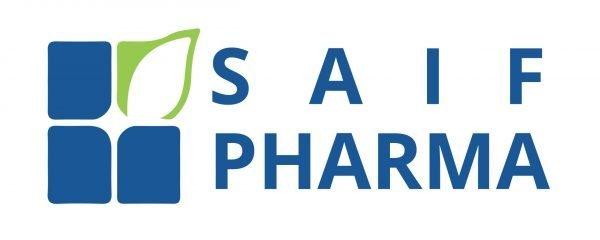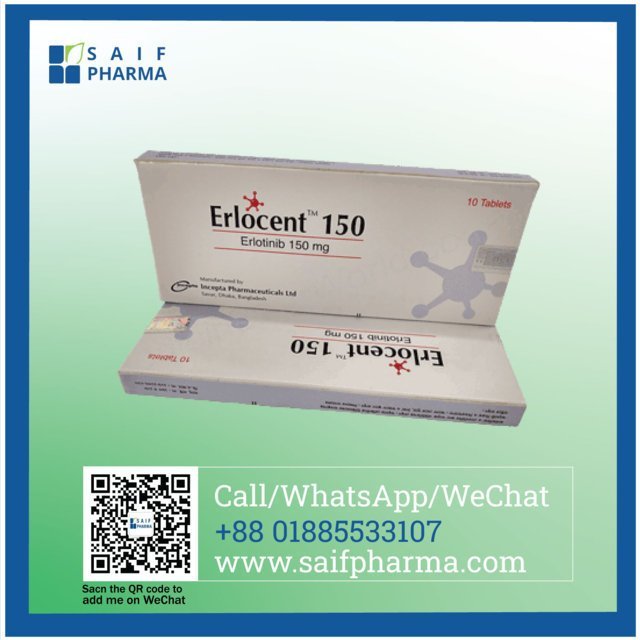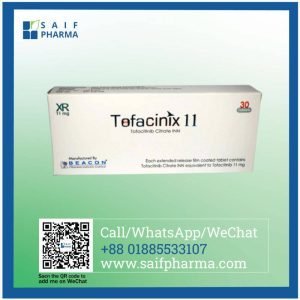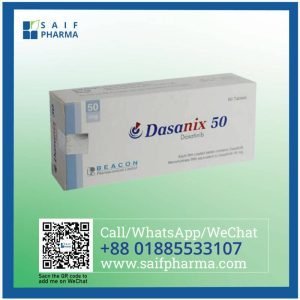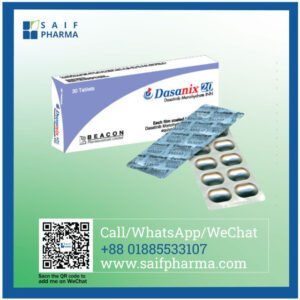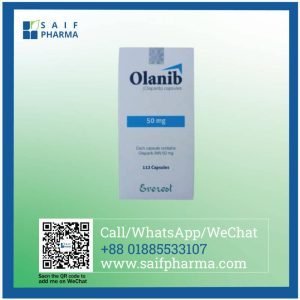Erlocent 150 mg (Erlotinib)
First-line treatment of patients with metastatic Non-Small Cell Lung cancer (NSCLC) whose tumors have Epidermal Growth Factor Receptor (EGFR) exon 19 deletions or exon 21 substitution mutations as detected.
Maintenance treatment of patients with locally advanced or metastatic NSCLC whose disease has not progressed after four cycles of platinum-based first-line chemotherapy.
Treatment of locally advanced or metastatic NSCLC after the failure of at least one prior chemotherapy regimen.
First-line treatment of patients with locally advanced, unresectable, or metastatic pancreatic cancer, in combination with gemcitabine.
Description
Dosage & Administration
NSCLC: The recommended daily dose of Erlotinib for NSCLC is 150 mg taken on an empty stomach, i.e., at least one hour before or two hours after the ingestion of food. Treatment should continue until disease progression or unacceptable toxicity occurs.
Pancreatic Cancer: The recommended daily dose of Erlotinib for pancreatic cancer is 100 mg taken once daily in combination with gemcitabine. Take Erlotinib on an empty stomach, i.e., at least one hour before or two hours after the ingestion of food. Treatment should continue until disease progression or unacceptable toxicity occurs.
Reduce Erlotinib by 50 mg decrements: If severe reactions occur with concomitant use of strong CYP3A4 inhibitors (such as atazanavir, Clarithromycin, Indinavir, Itraconazole, Ketoconazole, Nefazodone, Nelfinavir, Ritonavir, Saquinavir, Telithromycin, Voriconazole or grapefruit or grapefruit juice] or when using concomitantly with an inhibitor of both CYP3A4 and CYP1A2 (e.g., Ciprofloxacin).
Increase Erlotinib by 50 mg increments as tolerated for Concomitant use with CYP3A4 inducers, such as rifampin, rifabutin, rifapentine, phenytoin, carbamazepine, phenobarbital, or St. John’s Wort. Increase doses by 50 mg increments at 2-week intervals to a maximum of 450 mg. Avoid concomitant use, if possible.
Concurrent cigarette smoking: Increase by 50 mg increments at 2-week intervals to a maximum of 300 mg. Immediately reduce the dose of Erlotinib to the recommended dose (150 mg or 100 mg daily) upon cessation of smoking.
Interaction
Anticoagulants: Interaction with coumarin-derived anticoagulants, including warfarin, leads to increased International Normalized Ratio (INR) and bleeding adverse reactions.
CYP3A4 inhibitors: Erlotinib is metabolized predominantly by CYP3A4. Co-treatment with the potent CYP3A4 inhibitor ketoconazole increased Erlotinib AUC by 67%. When Erlotinib was co-administered with Ciprofloxacin, an inhibitor of both CYP3A4 and CYP1A2, the Erlotinib exposure [AUC] and maximum concentration [Cmax] increased by 39% and 17%, respectively.
CYP3A4 inducers: Pre-treatment with the CYP3A4 inducer Rifampicin for 7-11 days prior to Erlotinib decreased Erlotinib AUC by 58% to 80%. Dose modifications are recommended.
Drugs affecting gastric pH: Co-administration of Erlotinib with omeprazole decreased Erlotinib AUC by 46% and co-administration of Erlotinib with Ranitidine 300 mg decreased Erlotinib AUC by 33%.
Side Effects
The most common adverse reactions (20%) with Erlotinib from a pooled analysis of studies were rash, diarrhea, anorexia, fatigue, dyspnea, cough, nausea, and vomiting. The following are serious adverse reactions, which may include fatalities.
- Interstitial Lung Disease (ILD)
- Renal Failure
- Hepatotoxicity with or without Hepatic Impairment
- Gastrointestinal Perforation
- Bullous and Exfoliative Skin Disorders
- Myocardial Infarction/Ischemia
- Cerebrovascular Accident
- Microangiopathic Hemolytic Anemia with Thrombocytopenia
- Ocular Disorders
- Hemorrhage in Patients Taking Warfarin
Pregnancy & Lactation
Precautions & Warnings
- Interstitial Lung Disease (ILD): Occurs in 1.1% of patients. Withhold Erlotinib for acute onset of new or progressive unexplained pulmonary symptoms, such as dyspnea, cough and fever. Discontinue Erlotinib if ILD is diagnosed.
- Renal Failure: Monitor renal function and electrolytes, particularly in patients at risk of dehydration. Withhold Erlotinib for severe renal toxicity.
- Hepatotoxicity with or without hepatic impairment including hepatic failure and hepatorenal syndrome: Monitor periodic liver testing. Withhold or discontinue Erlotinib for severe or worsening liver tests.
- Gastrointestinal perforations-discontinue Erlotinib.
- Bullous and exfoliative skin disorders-discontinue Erlotinib.
- Myocardial infarction (Ml)/ischemia: The risk of Ml is increased in patients with pancreatic cancer.
Use in Special Populations
Pediatric use: The safety and effectiveness of Erlotinib in pediatric patients have not been established.
Geriatric use: No overall differences in safety or efficacy were observed between subjects 65 years and older and those younger than 65.
